Posted on Tuesday 28 April 2009
VICE PRES. CHENEY: I’m going to be careful here, Tim, because I – clearly it would be inappropriate for me to talk about operational matters, specific options or the kinds of activities we might undertake going forward. We do, indeed, though, have, obviously, the world’s finest military. They’ve got a broad range of capabilities. And they may well be given missions in connection with this overall task and strategy. We also have to work, though, sort of the dark side, if you will. We’ve got to spend time in the shadows in the intelligence world. A lot of what needs to be done here will have to be done quietly, without any discussion, using sources and methods that are available to our intelligence agencies, if we’re going to be successful. That’s the world these folks operate in, and so it’s going to be vital for us to use any means at our disposal, basically, to achieve our objective.MR. RUSSERT: There have been restrictions placed on the United States intelligence gathering, reluctance to use unsavory characters, those who violated human rights, to assist in intelligence gathering. Will we lift some of those restrictions?VICE PRES. CHENEY: Oh, I think so. I think the – one of the by-products, if you will, of this tragic set of circumstances is that we’ll see a very thorough sort of reassessment of how we operate and the kinds of people we deal with. There’s – if you’re going to deal only with sort of officially approved, certified good guys, you’re not going to find out what the bad guys are doing. You need to be able to penetrate these organizations. You need to have on the payroll some very unsavory characters if, in fact, you’re going to be able to learn all that needs to be learned in order to forestall these kinds of activities. It is a mean, nasty, dangerous dirty business out there, and we have to operate in that arena. I’m convinced we can do it; we can do it successfully. But we need to make certain that we have not tied the hands, if you will, of our intelligence communities in terms of accomplishing their mission.MR. RUSSERT: These terrorists play by a whole set of different rules. It’s going to force us, in your words, to get mean, dirty and nasty in order to take them on, right? And they should realize there will be more than simply a pinprick bombing…VICE PRES. CHENEY: Yeah, the – I think it’s – the thing that I sense – and, of course, that’s only been a few days, but I have never seen such determination on the part of – well, my colleagues in government, on the part of the American people, on the part of our friends and allies overseas, and even on the part of some who are not ordinarily deemed friends of the United States, determined in this particular instance to shift and not be tolerant any longer of these kinds of actions or activities.
Cheney’s political career began in 1969, as an intern for Congressman William A. Steiger during the Richard Nixon Administration. He then joined the staff of Donald Rumsfeld, who was then Director of the Office of Economic Opportunity from 1969–70. He held several positions in the years that followed: White House Staff Assistant in 1971, Assistant Director of the Cost of Living Council from 1971–73, and Deputy Assistant to the president from 1974–1975. It was in this position that Cheney suggested in a memo to Rumsfeld that the Ford White House should use the Justice Department in a variety of legally questionable ways to exact retribution for an article published by The New York Times investigative reporter Seymour Hersh. Cheney was Assistant to the President under Gerald Ford. When Rumsfeld was named Secretary of Defense, Cheney became White House Chief of Staff, succeeding Rumsfeld. He later was campaign manager for Ford’s 1976 presidential campaign as well.
During the Clinton years, besides being C.E.O. of Halliburton, he and his wife Lynne were active characters at the American Enterprise Institute. Dick was one of the Founders of the Project for the New American Century. In their documents, one can read of their grand plans for increased military might, for unseating Saddam Hussein, and of their disdain for the State Department and the C.I.A. Cheney, the author of the Minority Report of the Iran-Contra committee, was a "hawk" from birth.
I doubt that this "dark side" business was yet specific by September 16th, 2001. It was just a reflection of his general disdain for our "rules." We needed to get tough, and strong, and kick some ass, and Dick Cheney saw in 9/11 the chance to bring back the Reagan Ideal of America’s superiority above all others – to use Wolfowitz’s old phrase, "strength without equal." And I am sure that by September 16th, 2001, Cheney saw 9/11 as his chance to unseat Saddam Hussein in Iraq. What we do know is that they got into high gear looking for reasons to go to war with Iraq. Here again are Rumsfeld’s notes immediately after the attack:
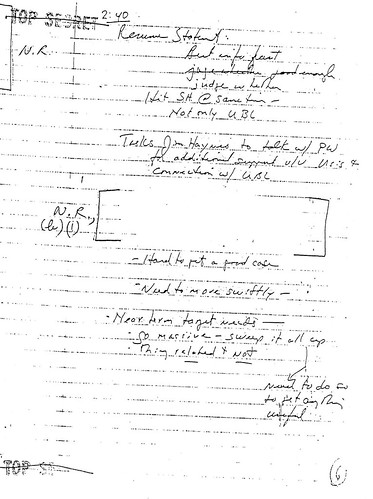
Best info fastJudge whether good enoughHit SH @ same time– not only UBLTasks. Jim Haynes to talk with PWfor additional support -?-connection with UBL
But that wasn’t all of it, maybe not even the center of it. They were looking for some way to tie bin Laden’s al Qaeda and Saddam Hussein’s Iraq together, so they tried to get a prisoner with Schizophrenia to do that for them to keep from being drowned. I now believe that to be true. It’s the only thing that makes this bizarre story make any sense. Everything else was full of holes. All the stuff Powell was going to say in his future U.N. speech was conjecture at best. The Niger Uranium Hoax was already debunked by the C.I.A. The aluminum tubes allegations were discredited by our own scientists at first glance. Douglas Feith’s bin Laden/Hussein connections [that le later leaked to the Weekly Standard] were also fabricated. Either Cheney was sure he was right that Hussein was behind the attack like paranoid people tend to be, or Cheney didn’t care about the truth and was just looking for something to corroborate what he wanted to. And is there any difference between the two when it’s all said and done?
So, the debate isn’t really about torture any more than the debate about Valerie Plame was about the legality of outing a C.I.A. Agent. The debate is about fabricating evidence in order to start a War with another soveriegn country. That’s what they did.


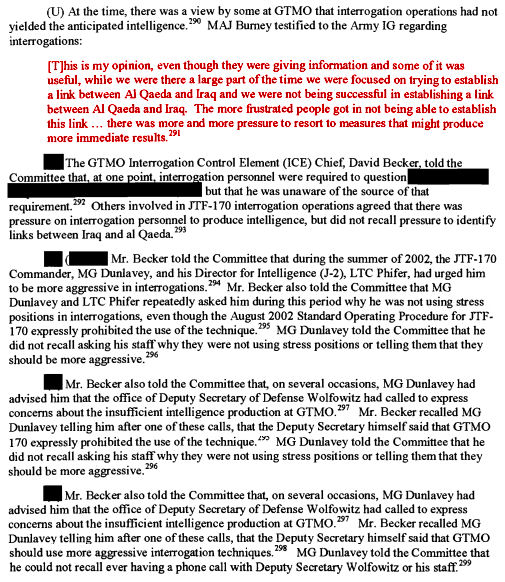

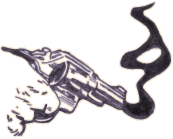 … Five years after the Abu Ghraib revelations, we must acknowledge that our government methodically authorized torture and lied about it. But we also must contemplate the possibility that it did so not just out of a sincere, if criminally misguided, desire to “protect” us but also to promote an unnecessary and catastrophic war. Instead of saving us from “another 9/11,” torture was a tool in the campaign to falsify and exploit 9/11 so that fearful Americans would be bamboozled into a mission that had nothing to do with Al Qaeda. The lying about Iraq remains the original sin from which flows much of the Bush White House’s illegality…
… Five years after the Abu Ghraib revelations, we must acknowledge that our government methodically authorized torture and lied about it. But we also must contemplate the possibility that it did so not just out of a sincere, if criminally misguided, desire to “protect” us but also to promote an unnecessary and catastrophic war. Instead of saving us from “another 9/11,” torture was a tool in the campaign to falsify and exploit 9/11 so that fearful Americans would be bamboozled into a mission that had nothing to do with Al Qaeda. The lying about Iraq remains the original sin from which flows much of the Bush White House’s illegality…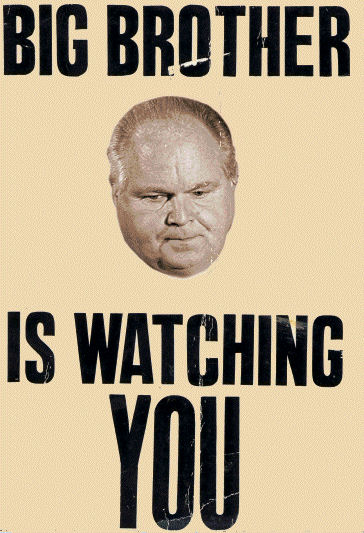 Shane Murphy, second-in-command aboard the ship seized by Somali pirates this month, is happy to be home. But he’s not happy to be sharing turf with land-lubber Rush Limbaugh, who politicized the pirate affair by referring to the pirates as "black teenagers."
Shane Murphy, second-in-command aboard the ship seized by Somali pirates this month, is happy to be home. But he’s not happy to be sharing turf with land-lubber Rush Limbaugh, who politicized the pirate affair by referring to the pirates as "black teenagers."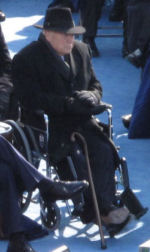 Former vice president Richard B. Cheney is asking for the release of two CIA reports in his bid to marshal evidence that coercive interrogation tactics such as waterboarding helped thwart terrorist plots, according to documents released yesterday by the National Archives and Records Administration. Cheney’s request was submitted March 31, more than two weeks before President Obama decided to release four "top secret" memos in which Bush administration lawyers sanctioned harsh tactics for questioning prisoners.
Former vice president Richard B. Cheney is asking for the release of two CIA reports in his bid to marshal evidence that coercive interrogation tactics such as waterboarding helped thwart terrorist plots, according to documents released yesterday by the National Archives and Records Administration. Cheney’s request was submitted March 31, more than two weeks before President Obama decided to release four "top secret" memos in which Bush administration lawyers sanctioned harsh tactics for questioning prisoners.
 With each new revelation on U.S. torture in Iraq, Afghanistan and Gitmo (and who, knows, probably elsewhere), I am reminded of the chilling story of Alyssa Peterson, who I have written about numerous times in the past three years but now with especially sad relevance. Appalled when ordered to take part in interrogations that, no doubt, involved what we would call torture, she refused, then killed herself a few days later, in September 2003.
With each new revelation on U.S. torture in Iraq, Afghanistan and Gitmo (and who, knows, probably elsewhere), I am reminded of the chilling story of Alyssa Peterson, who I have written about numerous times in the past three years but now with especially sad relevance. Appalled when ordered to take part in interrogations that, no doubt, involved what we would call torture, she refused, then killed herself a few days later, in September 2003.
 My reason for not thinking that the "torture worked" argument matters very much is that it’s an obvious evasion of our questions. When someone is saying that "it wasn’t torture" and that "the torture worked" at the same time, there’s something very wrong. Even more absurd, Cheney argues that there’s still a threat, so we should keep
My reason for not thinking that the "torture worked" argument matters very much is that it’s an obvious evasion of our questions. When someone is saying that "it wasn’t torture" and that "the torture worked" at the same time, there’s something very wrong. Even more absurd, Cheney argues that there’s still a threat, so we should keep